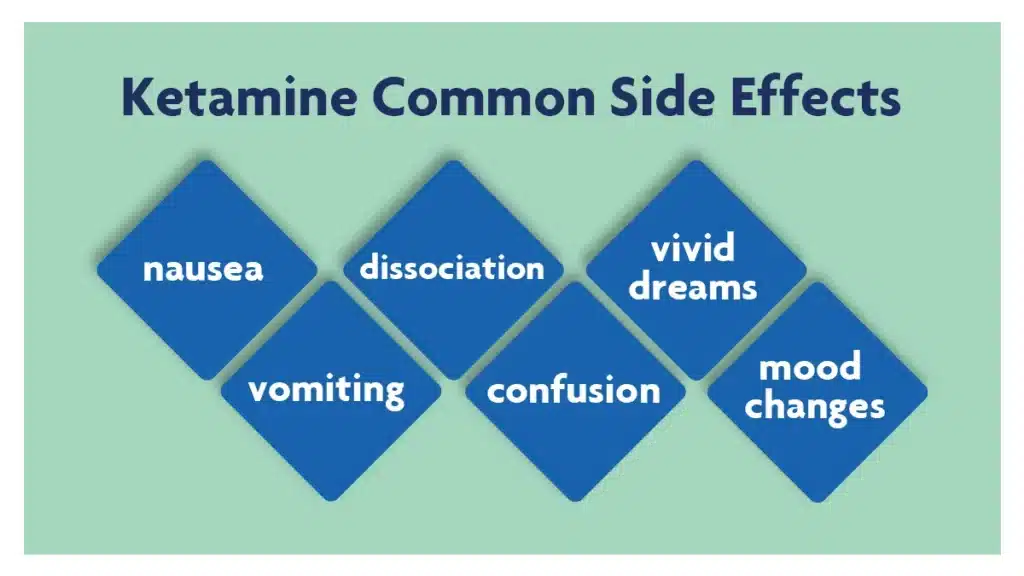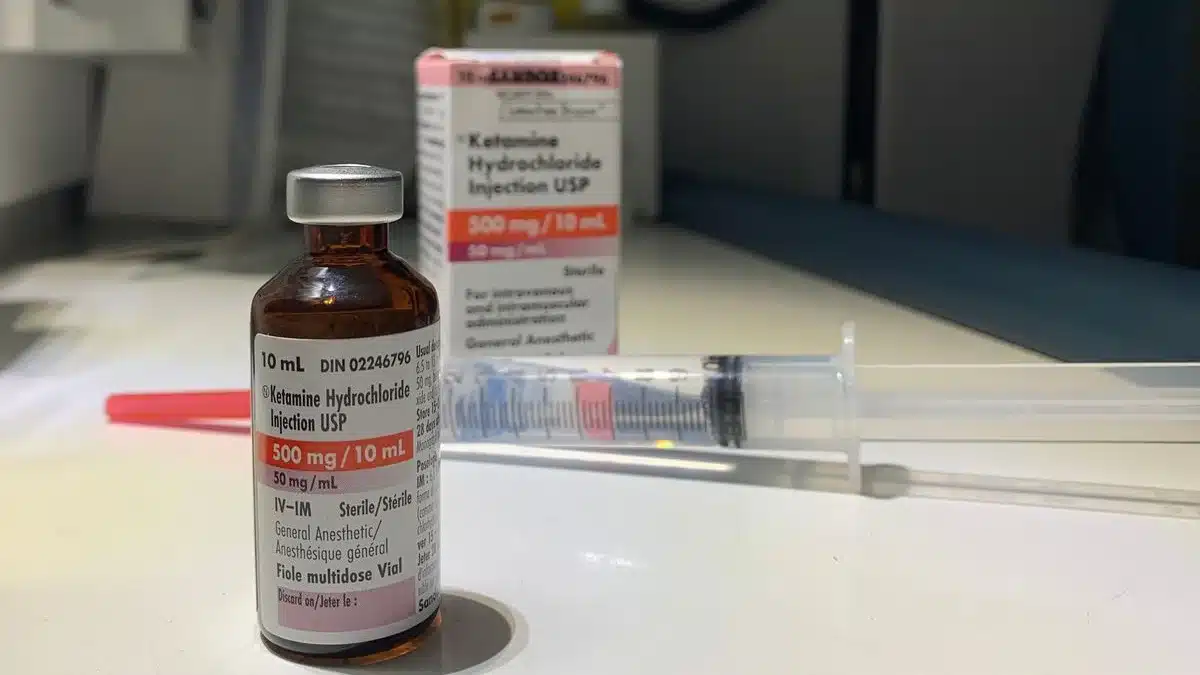Ketamine therapy, a breakthrough treatment for treatment-resistant depression, involves the use of the dissociative anesthetic drug ketamine. Ketamine use can pose serious risks, such as substance use disorders. That emphasizes the need for personalized approaches to teen mental health.
Key Takeaways
Ketamine therapy is known to rapidly treat depression and various mental disorders, but it can have severe side effects. Here’s what you need to know:
- From nausea to hallucinations, ketamine can cause physical and psychological effects.
- Common and severe side effects include feelings of alienation and potential addiction risks.
- Seek medical advice regarding its pros and cons before undergoing ketamine treatment.
Our teen treatment center supports teens through addiction treatment.

How Ketamine Therapy Works
Ketamine therapy, employed for people with major depression and chronic pain, works through subanesthetic doses of the dissociative anesthetic ketamine. The mechanism influences glutamate neurotransmission in the brain, leading to rapid and potent antidepressant effects.
The distinct impact on neural pathways and the potential to address a spectrum of conditions highlight its versatility. Administered under controlled conditions, it necessitates monitoring vital signs due to its powerful impact and negative effects.
Understanding Potential Side Effects
Ketamine infusion, a novel approach to the treatment of mental disorders, offers beneficial results, but it is crucial to be aware of possible side effects. Here are the common and severe side effects you need to know:
Common Side Effects
Ketamine therapy, given through low-dose ketamine infusion, can cause acute effects, including dissociation from reality, nausea, and vomiting. Common short-term side effects experienced during or after treatment are confusion, vivid dreams, and mood changes. Nightmares, though infrequent, may also occur but are generally temporary.
Serious Side Effects
Ketamine infusion therapy has proven effective treatment in mental health care. However, it is vital to be cautious due to possible serious side effects, such as respiratory depression, especially when higher doses are taken.
Suicidal thoughts and ideation, though rare, underscore the need for vigilant medical supervision, especially in individuals with a history of mood disorders. The powerful effects of ketamine, when used as a club drug, can have diverse impacts on the body. It is crucial for individuals undergoing ketamine therapy to recognize both the acute and potential long-term effects.
Effects on Mind and Body
Understanding how ketamine therapy impacts both the mind and body is essential for anyone considering or undergoing this treatment. Let’s break down the psychological and physical effects for a clearer picture.
Psychological Effects
Ketamine therapy aims to alleviate depressive symptoms. Individuals may experience positive shifts in mood. However, it may trigger severe mood swings and agitation. One of the psychological effects includes an increased risk of suicidal ideation. Patients should be vigilant for any thoughts of suicide and communicate them promptly for support.
While ketamine is used therapeutically, recreational use can impact the teen brain and lead to a state of mind where individuals feel detached from reality. Long-term misuse can lead to mental dependence on this drug.
Physical Effects
Ketamine injections may affect heart rate, posing potential risks for those with pre-existing heart problems. Regular monitoring is essential to address any adverse effects promptly. Unwanted physical effects like sedation (feeling overly relaxed), intraocular pressure, and nystagmus (involuntary eye movement) may occur. These symptoms are typically short-lived but are closely observed during treatment.
Ketamine therapy is associated with potential effects on the bladder. Understanding and managing this aspect is vital to ensure patients’ overall well-being. In navigating the benefits of ketamine therapy, individuals, along with their healthcare providers, should be well-informed about these physical side effects.
Overdose Risk and Withdrawal Symptoms
Overdosing on ketamine is a concern when taking too much of the drug. It can lead to severe confusion, breathing problems, and even unconsciousness. Ketamine doesn’t typically cause physical withdrawal symptoms, but abruptly stopping use may result in psychological effects like mood changes or cravings.
It’s important to use ketamine only as prescribed by a healthcare professional and to seek help if there are concerns about misuse. If someone experiences symptoms of an overdose due to drug abuse, seek emergency medical attention immediately.
Mitigating Side Effects of Ketamine Therapy
Healthcare providers often use smaller doses of ketamine and provide a comfortable environment to mitigate the risk of side effects. If someone feels dizzy or nauseous, informing the medical team helps adjust the dosage for a more comfortable experience.
Before beginning ketamine therapy, it’s essential to take specific precautions for a safer experience.
- Medical Evaluation: Ensure a thorough medical evaluation to determine whether ketamine therapy is appropriate.
- Health History: Share complete health history, including medications and existing conditions.
- Monitoring: Regularly monitor vital signs during therapy sessions.
- Communication: Openly communicate any discomfort or concerns to the healthcare team.
In taking these precautions, the therapy can be more effective and safer. Always follow medical advice and discuss any worries or questions with the healthcare provider to make the most of ketamine therapy.
Weighing the Pros and Cons of Ketamine Therapy
Ketamine therapy for mental health conditions, particularly for severe depression and post-traumatic stress disorder (PTSD), has its pros and cons. On the positive side, ketamine has shown promise in rapidly alleviating symptoms, offering quick relief. Ketamine clinics provide a controlled setting for administration, ensuring safety. The convenience of a nasal spray form adds to its appeal. However, drawbacks include potential side effects such as dizziness, nausea, and suicidal thoughts, and may lead to addiction.
Moreover, there is limited research on its long-term effects. Additionally, accessibility and costs associated with ketamine therapy can be barriers. In weighing these factors, it’s essential to consult professionals and assess individual needs before exploring this evolving approach to mental health treatment.
Frequently Asked Questions (FAQ)
Are there any long-term side effects of using ketamine therapy?
Research on the long-term effects of ketamine therapy is limited, and potential side effects vary among individuals. Some reported concerns include cognitive issues, urinary problems, nausea, and potential impact on mental health, leading to major depression. It’s crucial for individuals considering ketamine therapy to consult with qualified healthcare professionals.
What precautions should be taken when using ketamine infusion therapy for depression and anxiety?
When undergoing ketamine infusion therapy for depression and anxiety, it’s essential to follow medical guidance. Choose experienced medical professionals for administration, ensuring they use low doses. Monitor potential benefits and side effects closely.
Only use ketamine products prescribed by healthcare providers. Inform them of any pre-existing conditions or medications. Regularly discuss your progress with the medical team to adjust the treatment plan if needed.
What are the risks of ketamine?
Ketamine use carries potential risks, including elevated blood pressure and a risk of substance use disorders. High doses may lead to dissociation, hallucinations, and confusion.
Abuse can result in addiction and adverse psychological effects. Individuals with high blood pressure or a history of substance use disorders should approach ketamine cautiously.
Helping Teens Escape Addiction
For holistic ketamine addiction treatment and advice, reach out to our teen treatment center.
Our medical team crafts a personalized treatment plan at residential rehab to help your teen overcome the side effects of ketamine and mental problems. We offer family counseling, group, and art therapy for long-term recovery.
Call us today at (845) 479-6888 for more information.


